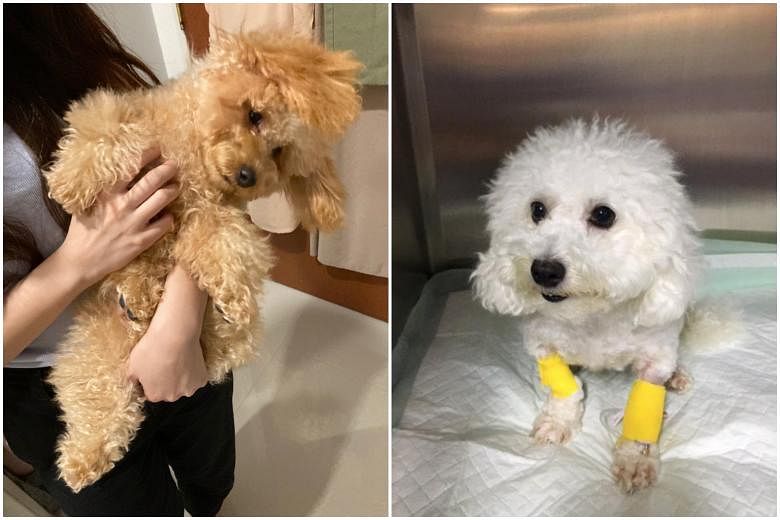SINGAPORE - In this fortnightly column, veterinarians from the National Parks Board answer questions about pet health and behaviour.
Is my toy poodle having teething problems?
I have a toy poodle named Ollie who will be eight months old in June. He is cheeky and playful, and likes to nibble on almost anything - toys, hands, hair and also people's toes.
A few of his baby teeth have fallen out, replaced by adult teeth. I am not sure if his nibbling habit is due to teething.
How can I change his behaviour? I have tried a little positive reinforcement when he chews his toys but it has not worked.
Sheryl Lin
Chewing and nibbling is normal behaviour for dogs. Young puppies tend to nip and use their mouths as a form of play.
Like humans, young puppies also go through a stage when they lose their "baby" or "milk" teeth and adult teeth emerge as part of normal dental development. During the teething process, chewing behaviour in dogs may intensify as a means of relieving potential discomfort around the gums.
Excessive or compulsive chewing on objects can also be triggered by a lack of physical or mental stimulation, stress or frustration. In addition, dogs may accidentally choke on or swallow something.
While nipping may not cause serious injury now, such behaviour tends to get more severe over time. It is best to get your dog checked by a veterinarian to see if his teeth are growing normally.
To help your dog learn not to nip you or others, give itsafe chewing toys or treats, and use them to redirect his attention away from you. Praise and reward him with treats when he stops nipping you and others.
Keep your dog away from household items that should not be chewed on, such as electrical wires or chemical products and provide him with exercise and play-time every day to keep him mentally and physically stimulated.
Nipping issues can be challenging to work with and it is advisable to consult your vet or a qualified animal behaviourist.
Constant paw-licking habit
I have a five-year-old poodle and would like to know why she licks her paws often.
Also, how do pet owners manage dogs that are prone to slipped discs? My dog had a slipped disc before and was in a lot of pain.
Low Li Ping
Dogs generally lick their paws due to itching which can be caused by allergies; infestation by parasites such as fleas and mites; or bacterial or yeast infections.
It is important to identify the root cause as compulsive licking can damage the skin and allow infection to set in.
A thorough physical examination by a vet will be needed.
Skin or hair samples may be taken for further analysis. Parasite and skin infections, if present, must be treated first.
To rule out allergies, your dog may need to undergo a strict diet over a period of time or have specialised blood and skin tests, so that the allergen can be identified and avoided.
Slipped discs occur when the discs between the vertebrae of the spinal column slip out of place and press on the spinal cord. It can cause symptoms including pain, weakness, paralysis and even incontinence. Some dogs may be more predisposed to this condition or be more severely affected than others.
When these symptoms occur, it is best to contact your veterinarian for a check-up as soon as possible. Depending on the severity of your dog's condition, treatment usually involves pain medication and adequate rest to prevent further damage to the spine. Surgery may be recommended.
Avoid engaging your dog in overly strenuous physical activities, such as jumping off high surfaces. For skin conditions and slipped discs, it is best to discuss treatment options and management plans with your vet.
- Answers by Dr Christine Lee, a veterinarian at the Animal & Veterinary Service who graduated from the Royal Veterinary College in the United Kingdom.
Write in
Have a query about your pet? E-mail it with clear, high-resolution pictures of at least 1MB, if any, and your full name to stlife@sph.com.sg. We reserve the right to edit and reject questions.

